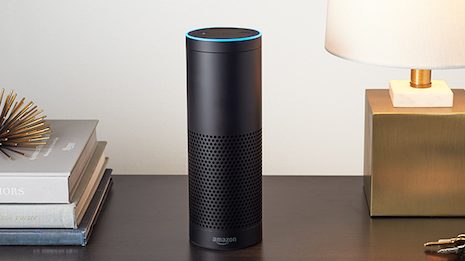- About
- Subscribe Now
- New York,
October 19, 2018

 Millennials believe Alexa will improve its emotional intelligence over time. Image credit: Amazon
Millennials believe Alexa will improve its emotional intelligence over time. Image credit: Amazon
As brands increasingly rely on artificial intelligence technology to handle consumer interactions, customers are wary that these digital tools will instead make shopping less personal and more frustrating.
In a new report from Adobe and Invoca, 80 percent of respondents believe face-to-face interactions with a brand representative result in the most empathetic service experiences. However, 29 percent of respondents below the age of 35 believe AI-powered voice assistants, including Alexa and Siri, will improve their emotional quotients over time.
"In the near term, brands will need to be careful to not over-automate the customer experience," said Julia Stead, vice president of marketing at Invoca, Santa Barbara, CA. "Brands will be successful if they can find ways to balance tech innovation with thoughtful human interaction."
The findings are based on Invoca's survey of 1,000 consumers in the U.S. as well as data from Adobe’s Experience Index. Adobe surveyed 1,500 consumers about their brand interactions across several sectors.
Emotional quotient
Whether consumers have the vocabulary for it or not, a brand's emotional quotient, otherwise known as emotional intelligence, is actually crucial to them when making a stressful decision.
About a third, 34 percent, of consumers 55 and older have heard of EQ, compared to 71 percent of respondents below the age of 35. A quarter of all respondents said emotional awareness is the most important attribute a sales representative can have in a complicated purchase scenario, and the majority said this quality can be demonstrated in-person or over the phone.
Alibaba has opened up an artificial intelligence-enabled concept store. Image Credit: Alibaba
Ninety percent of consumers consider "problem-solving" an important characteristic when interacting with a brand, followed by "support" and "efficiency" at 89 and 88 percent, respectively. Personalization, which has recently been a focal point for many luxury brands, is vital to 75 percent of shoppers.
Brands should still aspire to improve personalization efforts while respecting privacy, with Adobe's research finding that consumers most valued brands that "know them and respect them."
Brands need to balance personalization with privacy protection. Image credit: Lancôme
Adobe's Experience Index also found that 53 percent of respondents would rather interact with a person than a computer. Less than a quarter of consumers found voice assistants or chatbots effective at providing emotional intelligence.
Nonetheless, just shy of 70 percent of customers expect brands to use more AI platforms to communicate with them within the next five years. While 61 percent of respondents believe AI will make shopping faster, the same number of consumers think it will also make the process more impersonal.
Millennials are more optimistic of this integration, with 54 percent believing AI will gain EQ in the same timeframe.
AI growth
Despite consumer concerns, brands across sectors have begun using artificial intelligence and machine learning to streamline their data analytics, personalize customer experiences and engage with the right target consumers.
Artificial intelligence is poised to play a much larger role in the retail and marketing worlds soon with its market value projected to reach $105.8 billion in the next seven years. AI has the potential to help luxury brands create the type of personalized experience that consumers expect.
According to a report from Tractica, artificial intelligence will become increasingly relevant over the next few years with a significant number of major retailers and advertisers making use of the technology. Marketing and voice recognition software are currently two of the most popular uses for AI that can have a direct benefit on a brand’s ability to market and sell its products (see story).
However, shoppers and retailers are not on the same page when it comes to the future of retail technology, with many brands investing in high-tech features that have little to no traction among today's customers.
According to a new report from Klarna, 73 percent of consumers explicitly value in-store shopping trips. However, 42 percent of retailers are prioritizing online shopping technology, indicating a disconnect between strategy and consumer preferences as bricks-and-mortar experiences are neglected (see story).
Consumers also prefer to spend their money on emotionally-cognizant companies that provide quality customer service, directly benefiting brands' bottom lines. The more emotionally connected shoppers are, the more likely they are to make frequent purchases and recommendations (see story).
"EQ [is] a 'buzzy' term in social media posts that have been largely shared and read more by the younger generation," Invoca's Ms. Stead said. "That being said, this awareness will translate into expectations when it comes to brand interactions."
Share your thoughts. Click here